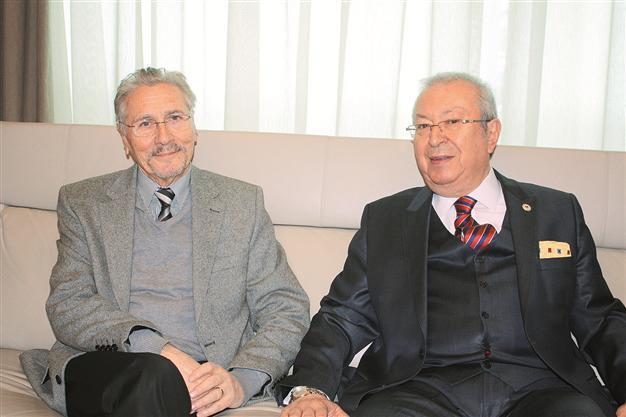Silk Road once a utopia, now a reality: Former Romanian president
Deniz Çiyan ISTANBUL
 The revival of the Silk Road project might have been a utopia when it was initiated in the 1990s, but the dream is now being realized, according to former Romanian President Emil Constantinescu.
The revival of the Silk Road project might have been a utopia when it was initiated in the 1990s, but the dream is now being realized, according to former Romanian President Emil Constantinescu.“In that time the Silk Road was a utopia, now it is a reality; pragmatically a reality,” Constantinescu told the Hürriyet Daily News during his visit to the 18th Eurasian Economic Summit organized by the Marmara Group Foundation.
Constantinescu said the idea of the revival of the Silk Road, the historic corridor linking Europe and Asia, especially China, was initiated by the then-president of Georgia, Eduard Shevardnadze, in the mid-1990s.
Stating that Shevardnadze had brought together former presidents of five countries, Süleyman Demiral from Turkey, Haydar Aliyev form Azerbaijan, Nursultan Nazarbayev from Kazakhstan and himself from Romania to revive the Silk Road, Constantinescu said that in order to implement the idea, they had to think globally and act locally.
“Why? If we only build bilateral relations and do not take into consideration regional relations, then it is a failure,” he said, adding that Turkey and Romania were the hub countries not only of the region but also in a global context.
Constantinescu, who delivered a speech titled “Cultural diplomacy and peace in the globalized world” during a special session of the summit, the “Sagacious Men Session” consisting of 13 former presidents from the Eurasian region, said Romania and Turkey were two bridging countries that brought together different parts of the world, making them significant for the wider trans-Eurasian region.
Stating that Romania had a double identity, as the Wallachia region of Romania was a part of the east and Transylvania was a “typical region from central Europe,” the former president said Romania’s location was important in its relations with Turkey.
“Romania is like a bridge between the eastern economy, philosophy, mentality, and Central, Western Europe. This is important in our relation with Turkey,” said Constantinescu, while claiming that Turkey’s bridging role between the European and Asian continents defined its importance for Europe.
Stating that although Romania had fought many wars against the Ottoman Empire, Constantinescu said Romanians had great trust in Turks because the latter had respected their words and agreements. Defining this trust as a “curiosity of history,” the former president said Turkish investors could find a friendly atmosphere in Romania to do serious business.
Constantinescu said he supported the idea of the Eurasian Economic Summit as it was a visionary approach to continue relations between the countries of Central Europe and Central Asia, within which Turkey was located in the middle. “Turkey has a pivotal role,” he said.
The Eurasian Economic Summits are annually organized with the active participation of national and international decision makers and experts in the fields of economy, politics, energy, sociology and security, with an aim to bring the countries’ businessmen, politicians and academics together.
















